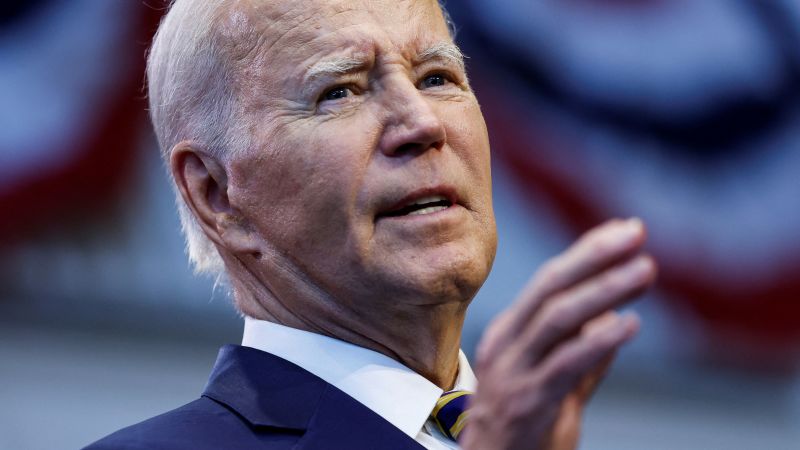Main Topic: Prisoner exchange between Iran and the United States, involving the release of American citizens held in Iran and the unfreezing of Iranian government assets.
Key Points:
1. Five Americans imprisoned in Iran have been placed under house arrest as part of the planned prisoner exchange.
2. The exchange will also involve the release of roughly $6 billion in Iranian government assets blocked under U.S. sanctions.
3. The prisoner exchange negotiations have been ongoing for months, with Qatar and other governments acting as intermediaries.
The Biden administration has agreed to unfreeze approximately $6 billion in Iranian assets in exchange for the release of five American citizens held by Iran, with the deal also calling for the freeing of five unidentified Iranians held by the US, triggering potential outrage due to the timing coinciding with the anniversary of the September 11 attacks.
The Biden administration has issued a waiver allowing $6 billion in Iranian funds to be transferred to Qatar, signaling progress in a deal to free five Americans who have been wrongfully detained in Iran.
Senate Foreign Relations Committee Chairman Bob Menendez expressed concerns about the Biden administration's decision to unfreeze $6 billion for Iran in exchange for the release of five U.S. prisoners, stating that it may encourage hostile nations to take more Americans hostage in the future.
Iranian President Ebrahim Raisi claims authority over how the $6 billion in previously frozen funds will be spent, despite U.S. officials stating that the money will be closely monitored and used exclusively for humanitarian purposes as part of the prisoner exchange agreement with the United States.
### Summary
The Biden administration issues a waiver allowing banks to transfer $6 billion in frozen Iranian oil funds in an effort to secure the release of American prisoners from Iran; the FDA approves a new coronavirus vaccine targeting the omicron subvariant; Morocco's slow acceptance of foreign earthquake aid raises confusion among foreign officials; the antitrust trial against Google begins, potentially impacting the tech landscape for the next decade; Hurricane Lee poses a threat to eastern New England; and Drew Barrymore is bringing back her talk show amidst the Hollywood strikes.
The Biden administration's decision to carry out a prisoner exchange with Iran, involving issuing a waiver to release $6 billion in frozen Iranian funds, has sparked outrage from Republicans who accuse Biden of paying a ransom to a state sponsor of terrorism.
Five Americans, who were wrongfully detained in Iran, have been freed and are being flown to Doha as part of a broader deal that includes the US unfreezing $6 billion in Iranian funds, marking a significant diplomatic breakthrough after years of complicated negotiations between the two countries.
Republican presidential candidate Chris Christie criticizes the Iran deal that led to the release of five American prisoners, stating that he would not have made the deal and expressing concerns about the use of funds by Iran.
Former President Trump criticizes President Biden's deal with Tehran to bring five Americans home from Iranian prisons, stating that he successfully brought 58 hostages home without paying anything and warns that paying for hostages sets a dangerous precedent.
A plane carrying five Americans freed by Iran landed in the United States, marking the conclusion of a prisoner swap deal between the two countries and the release of $6 billion in frozen funds.
Former governor and Republican presidential candidate Chris Christie criticized President Biden's prisoner exchange deal with Iran, stating that giving $6 billion to a terrorist state was unacceptable and would make Americans more vulnerable.
Iranian President Ebrahim Raisi says that the release of the five Americans from Iranian detention was prompted by purely humanitarian motives and was an opportunity to show the true face of Iran's humanitarian efforts, as he defends the decision to unfreeze Iranian funds.
Senator Marsha Blackburn heavily criticized President Joe Biden's recent hostage deal with Iran, stating that the released $6 billion will be used for uranium enrichment and nuclear proliferation rather than benefiting the Iranian people.
The Biden administration's strategy of prisoner swaps and concessions to secure the release of American hostages is raising concerns that it may incentivize more hostage-taking by hostile nations.
Former Speaker Kevin McCarthy is urging President Biden to refreeze $6 billion in Iranian funds, criticizing the Biden administration's prisoner swap and decision to unfreeze the funds, which many Republicans believe has supported Iran's military and terrorism efforts.
Biden administration officials defend transfer of frozen assets to Iran, denying connection between the assets and recent attacks by Hamas on Israel.
The United States and Qatar have agreed to deny Iran access to $6 billion in funds meant for humanitarian purposes, which were part of a prisoner release deal but have been criticized for potentially supporting Hamas.
Senate Democrats are urging the Biden administration to withhold $6 billion in funds set to be released to Iran following Hamas' attack on Israel, expressing concerns over Iran's potential involvement in the attack.
The U.S. and Qatari governments have quietly agreed to prevent Iran from accessing $6 billion in humanitarian aid that was unfrozen as part of a prisoner swap, following concerns over Iran's ties to Hamas' attacks on Israel.
White House National Security Council spokesman John Kirby acknowledged Iran's broad complicity in aiding Hamas and conducting terrorist attacks but emphasized that the Biden administration is holding Iran accountable and has not allowed them access to the $6 billion sent by the previous administration.
The Biden administration's misperception that Iran can be negotiated into civilized behavior has led to a policy of appeasement and a failure to detect Iran's preparations for the recent terrorist onslaught, highlighting the need for urgent review and a reversal of Biden's strategic calculus for the Middle East.
